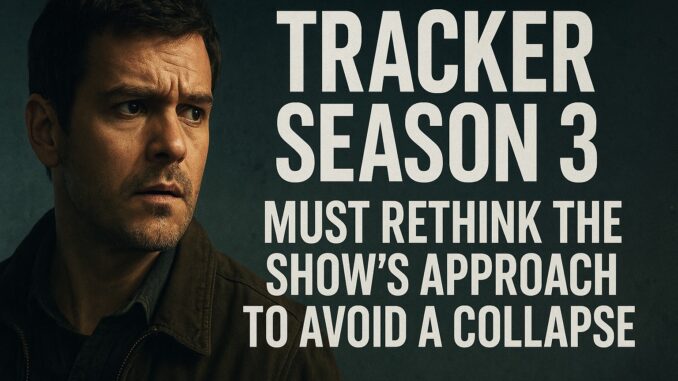
Tracker season 3 is on the horizon, and the upcoming installment of Colter Shaw’s (Justin Hartley) story may have to approach things a bit differently if the show hopes to maintain its audience. While Tracker season 3 will still heavily feature Colter as the central figure, showrunner Elwood Reid has been upfront about the fact that things are going to change for the series overall.
Tracker season 3 is on the horizon, and the upcoming installment of Colter Shaw’s (Justin Hartley) story may have to approach things a bit differently if the show hopes to maintain its audience. While Tracker season 3 will still heavily feature Colter as the central figure, showrunner Elwood Reid has been upfront about the fact that things are going to change for the series overall.
Colter, whose cases are typically rounded out with his team at their base camp from episode to episode, is often a lone wolf when it comes to helping track down the missing people that pop up on the series. While he often receives help from his lawyer Reenie Green (Fiona Rene), the rest of Colter’s team has been in flux.
While he started the series with two handlers, Teddi (Robin Weigert) and Velma Bruin (Abby McEnany), both have left the show, as has Colter’s original IT assistant Bobby Exley (Eric Graise). Tracker season 2 saw an extended disappearance from Bobby, who was replaced by his cousin Randy (Chris Lee) in a pinch, and the upcoming season will see Randy fold into the show.
Though Tracker has been able to rely solely on Colter as the focal point of the series, his connections are often sorely lacking for a procedural, especially one that features a team, even only in part. Reid has addressed that moving into next season, the show will address the underdeveloped team as one of Tracker’s weak points, but it may need to do more to stay steady.
Tracker has carved a niche: suspenseful, twisty, often satisfying. But entering Season 3, fans sense something off. Is the core magic slipping? Are the stakes felt less sharp? If the show keeps going in its current direction, the collapse will come—not from lack of story, but from lack of clarity, innovation, and emotional stakes. In this article, I’ll explore what Tracker Season 3 must rethink to avoid decline, using concrete examples, storytelling principles, and what viewers crave. Ready to dive in?
What’s Going Wrong in Tracker Season 3
Weakening Character Arcs
-
H3: Hero’s journey getting muddled
The protagonist’s motivations feel hazy. Viewers want to understand why they do what they do. If the “why” isn’t compelling, everything else feels hollow. -
H3: Villains without stakes
A great antagonist isn’t just evil; they challenge your heroes in ways that force growth. If Tracker’s villains feel one-dimensional, the tension flattens.
Predictable Plot Twists
-
H3: Recycled tropes
Reused betrayals, obvious double agents, the “twist” we already saw—they don’t impress if the execution is paint-by-numbers. -
H3: Creator fatigue shows
When the writers rely too much on shock rather than on story logic, the audience smells that the engine is running on fumes.
Dull Pacing and Losing Momentum
-
H3: Mid-season sag
Episodes where nothing really moves forward—characters talk in circles, investigations stall, suspense wanes. -
H3: Too many side plots not enough main plot
Side arcs are great—when they feed the main narrative. Otherwise they dilute the urgency.
What Viewers Want (That’s Missing Right Now)
Authentic Emotional Connection
-
H3: Flaws + vulnerability
When characters face doubt, fear, moral conflict, they feel real. Tracker needs to lean into that. -
H3: Relationships that evolve
Not just romantic, but friendships, rivalries, mentorships. The webs between characters matter.
Smart, Layered Storytelling
-
H3: Foreshadowing that pays off
Plant seeds early. If a twist seems random, audiences feel cheated. -
H3: Consequences that stick
Characters should suffer for mistakes. Sometimes permanently. That makes choices meaningful.
Originality and Surprise
-
H3: Subverting expectations
Don’t do the obvious. Let the story detour into surprising but consistent territory. -
H3: Grounded in its own rules
Even when twisty or supernatural, the show has internal consistency. Break that, and trust is lost.
How the Show Can Rethink Things—Key Strategies
Recenter the Story
-
H3: Define the core conflict early
Is this season about betrayal, identity, corruption, redemption? Decide and lean in hard. -
H3: Trim unnecessary threads
Too many side characters or tangents pull focus. Clarity over quantity.
Reinvent Character Journeys
-
H3: Give characters active goals
Don’t let them drift. Push them to act, face challenges, make choices—even wrong ones. -
H3: Allow real transformation
Let heroes and villains change. Better—or worse.
Elevate the Stakes
-
H3: Raise emotional risk
What does character lose if they fail? Family? Reputation? Self? -
H3: Make outcomes unpredictable
Let not everyone survive—or win. The fear of “what if” keeps us watching.
Improve Pacing and Structure
-
H3: Break up slow episodes with big reveals
Always leave someone wanting more at every episode. -
H3: Use cliffhangers and reversals wisely
Build momentum. But don’t overdo. Each reversal must matter.
Invest in Dialogue and Tone
-
H3: Realistic conversations
Not everything needs to be witty or expositional. Silence, subtext, tension matter. -
H3: Tone consistency with room for mood change
If you start serious, a sudden comedic tone shift must have reason.
Case Studies—Shows That Avoided Meltdown
Breaking Bad’s Mid-Season Slowdowns
-
H3: How they kept tension alive
Even in quieter episodes, character choices changed stakes. -
H3: Consequences ripple
Mistakes in one arc affect others. No reset button.
The Crown’s Balancing Acts
-
H3: Multiple storylines, one central thread
While many characters appear, the underlying theme (power, legacy, duty) ties it all. -
H3: Emotional weight earns the big set pieces
The release moments (royal events, scandals) feel earned.
Practical Recommendations for Tracker Team
Writers’ Room Refresh
-
Bring in fresh voices to avoid echo chamber. Sometimes you need someone who says: “This isn’t working.”
Audience Feedback Loop
-
Use test screening or social listening to catch where viewers feel disengaged. Comments, social media, forums matter.
Tighten Episode Outline Before Filming
-
Drafting plot and character beats, ensure each scene advances something (plot, character, theme).
Focus on One or Two Big Arcs
-
Rather than dozens of subplots, choose a few and do them exceptionally well.

Potential Pitfalls to Avoid
Overcorrection
-
Swinging so far away from what worked in earlier seasons that you alienate loyal fans.
Reliance on Spectacle Over Substance
-
Big action, big effects, twists won’t redeem weak character motivation or plot logic.
Ignoring Genre Expectations Entirely
-
Want surprise? Good. But fans of drama/suspense expect certain beats: tension, reveal, fallout. Deliver those.
Why It Matters—The Cost of Collapse
Viewer Drop-off Is Hard to Reverse
-
Once people tune out, they often don’t come back easily.
Brand Reputation Hurt
-
Shows that lose consistency get mocked, lose credibility, fewer award wins, fewer people talk about them.
Financial Fallout
-
Lower ratings = lower ad revenue, fewer streaming renewals, smaller budgets. A collapse can ripple behind the camera.
Signs Season 3 Is Already Heading Toward a Collapse
Flat Social Media Buzz
-
Less speculation, fewer memes. If people aren’t excited, something’s wrong.
Critics Calling Out Same Problems
-
“Plot holes,” “characters feel off,” “lack of dramatic stakes”—these are red flags.
Story Beats Feeling Predictable
-
If fans can call exactly what twist is coming next, tension is evaporating.
Conclusion
Tracker Season 3 stands at a crossroads. It could double down and shine, or coast and fade. To avoid collapse, the show must recenter character, raise stakes, sharpen pacing, and dare to surprise. Don’t just rely on what worked before—renew what makes the heart of the show beat. If the creative team listens—to the story, to the audience, and to the tasks above—then Season 3 can be the one fans remember, not the one they regret.
